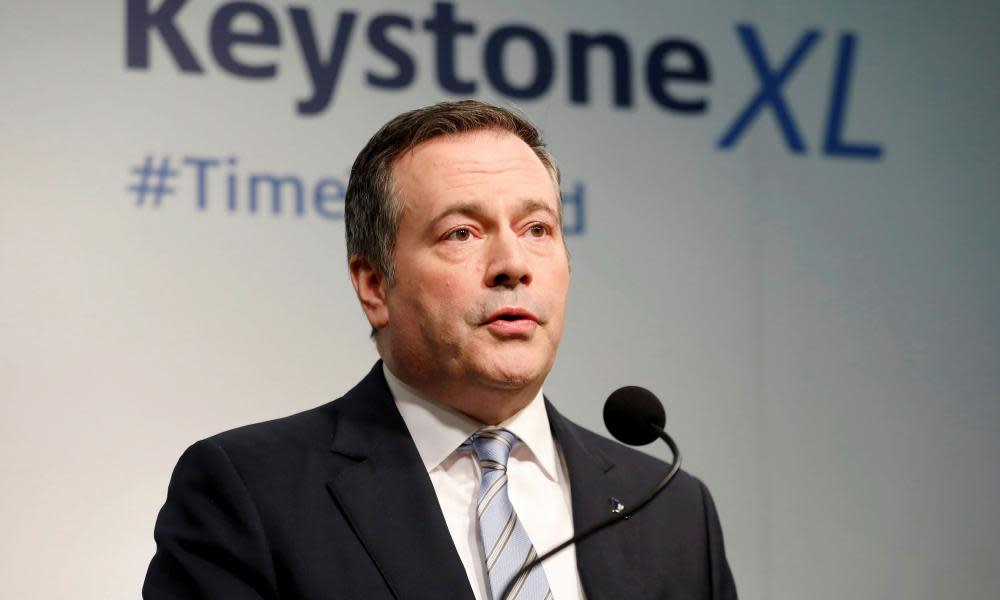Alberta leader says Biden's move to cancel Keystone pipeline a 'gut punch’

US president Joe Biden’s move to cancel a controversial pipeline project has hit Canada like “like a gut punch”, according to one political leader, and left the country to weigh the future prospects of its ailing oil and gas industry.
On 20 January, one of Biden’s first executive orders was to reverse approval of the Keystone XL pipeline, making good on a campaign promise to kill the project as a broader strategy to address the climate crisis.
Environmental groups in Canada have applauded the decision, but the cancellation has left the country’s western provinces in disbelief.
“The Biden administration refuses to give this country sufficient respect to hear us out on this pipeline. In that policy context then, yes, there absolutely must be reprisals,” Alberta premier Jason Kenney told CBC News. “We need to stand up for ourselves.”
The outspoken provincial leader, who called the decision a “gut punch”, has largely tied his province’s prosperity to the success of oil and gas projects – and demanded that Prime Minister Justin Trudeau move swiftly to reverse the decision.
“Obviously the decision on Keystone XL is a very difficult one for workers in Alberta and Saskatchewan who’ve had many difficult hits,” Trudeau told reporters last week, adding that it would be a top priority in his first call with president Biden. But Trudeau has stopped short of endorsing Kenney’s calls for “economic sanctions” against Canada’s largest trading partner.
TC Energy has long lobbied for the completion of the 1,700-mile pipeline expansion project, first proposed in 2005, to move 800,000 barrels of oil a day from eastern Alberta to Nebraska. Former President Barack Obama canceled it in 2015, but former President Donald Trump revived it in 2017.
Along the way, the project had met stiff opposition from environmental groups in Canada and the United States, who feared Keystone would only incentivize more development and investment in Alberta’s emissions-intensive oil sands.
“It’s very positive to see the new administration making this a priority,” said Alex Speers-Roesch, a climate campaigner with Greenpeace Canada. “And it’s really a sign that organizers and Indigenous communities have helped move the dial on climate politics.”
For nearly a decade, the province of Alberta–dubbed the “Texas of Canada” – has struggled to revive the halcyon days of its oil sands boom, which brought billions to the provincial coffers and created hundreds of thousands of jobs.
Yet sustained downturn in oil prices has left the province desperate for new ways to move oil.
In March, Alberta announced plans to invest nearly C$1.5bn ($US 1.18bn ) in Keystone XL, promising the project would generate C$30bn over the next two decades.
“We’re disappointed” by Biden’s choice, said Doug Jones, mayor of Oyen, Alberta. “But we’re holding out hope that decision will be reversed.”
The small town east of Calgary, which saw its population double to 2,000 as workers moved into work camps, was until last week the site of pipeline construction. With the project cancelled, hundreds have left the community.
While a number of Indigenous groups on both sides of the border fought the project, First Nations investors were also eager for a share of the pipeline revenue, illuminating the complex relationship between Indigenous communities and natural resource projects that thread their traditional territories. In November, a group of five First Nations announced plans to invest up to C$1bn in the Keystone project.
“There have been thousands of First Nations waiting in the winds for jobs in the industry,” said Dale Swampy, president of the pro-development National Coalition of Chiefs. “There’s no second economy many of us can rely on tomorrow. Show me where these green energy jobs are.”
Nearly 14,000 Indigenous people work in the oil and gas sector, according to a labour market survey from 2019. “These jobs pay at least 50% higher than other fields,” said Swampy, who sees the jobs as critical for addressing poverty within his community.
Other prominent leaders disagree.
“I absolutely believe the writing is on the wall for the oil industry,” Grand Chief Stewart Phillip, head of the Union of British Columbia Indian Chiefs, told the Canadian Press. “[Energy industry] jobs are transient in nature … It’s a myth that pipelines represent an economic boom for a particular area.”
Biden’s decision to cancel has also put Trudeau in a political bind. While the prime minister has campaigned on investing in renewable energy and reducing greenhouse gas emissions, his government has invested billions to ensure Alberta’s TransMountain pipeline expansion project sees completion.
Trudeau has also faced repeated accusations from premiers in western provinces that he isn’t attuned to the worsening economic and social circumstances– costing him a number of seats in the most recent election.
According a poll from the Angus Reid Institute released Tuesday, two thirds of Canadians felt the end of Keystone was “bad” for Alberta.

 Yahoo Movies
Yahoo Movies 
